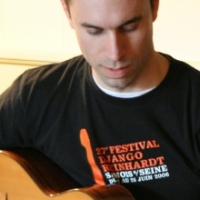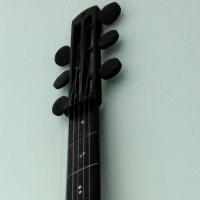DjangoBooks.com
Welcome to our Community!
Categories
- 20K All Categories
- 1.1K General
- 485 Welcome
- 60 Archtop Eddy's Corner
- 147 CD, DVD, and Concert Reviews
- 385 FAQ
- 26 Gypsy Jazz Italia
- 27 Photos
- 209 Gypsy Picking
- 21 Unaccompanied Django
- 15 Pearl Django Play-Along Vol.1
- 17 Gypsy Fire
- 45 Gypsy Rhythm
- 1.4K Gypsy Jazz University - Get Educated
- 131 Gypsy Jazz 101
- 231 Repertoire
- 228 History
- 709 Technique
- 51 Licks and Patterns
- 6 Daniel Givone Manouche Guitare Method Users Group
- 20 Eddie Lang Club
- 1.3K Gypsy Jazz Gear
- 816 Guitars, Strings, Picks, Amps, Pickups and Other Accessories
- 465 Classifieds
- 52 Recording
- 63 Other Instruments
- 18 Violin
- 5 Mandolin
- 22 Accordion
- 7 Bass
- 11 Woodwinds
- 351 Gypsy Jazz Events
- 144 North America
- 112 Europe
- 95 International
Who's Online (0)
Your first 1000 hours...
 djangology
Portland, OregonModerator
djangology
Portland, OregonModerator
I think all the time about what I would in my first 1000 hours if I started over. My opinion on this might change week to week, but if I was starting from scratch, I would:
- Be extra careful learning how to play rhythm, be introspective and record yourself playing rhythm, and play rhythm along to other peoples recordings.
- Memorize the chords to 10-30 songs as soon as you can and try not to use charts if possible.
- Get out a metronome and spend a portion of your first 1000 hours memorizing your favorite song (like Rhythm Futur) until the metronome is maxed out.
- Learn the waltz Dolores, the solo to I'll See You In My Dreams, and one of the Minor Swing solos.
- Memorize minor6th arp completely. Know where to play it.
- Memorize diminished arpeggios and search for variations of patterns.
- Know harmonic minor scale and how it relates to Phrygian Dominant, and where to play it.
What would other people recommend?












Comments
That's a good list Jon. I think one of the most effective things is to get yourself into a regular performance situation. Of course, that's not easy to do when you're starting, but even playing at a coffee house in front of other people can really help. There's a huge gap between what you think you can do in the practice room and what actually happens when you play in public, especially in high stress concert situations. It's really hard to get better unless you've fallen flat on your face hundreds of times. You'll practice much harder and more effectively knowing the spotlight will be on you soon.
Jamming is great too, but it can be a little too easy to lurk which prevents you from sharpening your skills.
Good list...
Not sure I'd spend a lot of time on Rhythm Futur, certainly great techniques to learn but it is not a song that you can play with everyone. Spending time on a specific song (something simple like Coquette or even Daphne) learning the ins and outs and some of the options (of course it can go infinite as far as options) would be where I would focus more time.
www.scoredog.tv
Should have got a practical knowledge of using arpeggios up and down the neck properly, way sooner than I really did. The major + minor triads, and the venerable m6/m7b5. Just knowing them in theory is not enough, gotta use them in practice!
Spent way too long playing within a 4 or 5 fret box, in one position, maybe shifting to another position and playing there. I mean playing in a box is a useful skill in jazz too, but to really get a Django sound you also want to be comfortable moving through an arpeggio horizontally, with fluidity and speed, over two octaves or more.
It was actually a bandmate who candidly mentioned it during a break on our gig once, "you should play horizontally more, there's something missing in your solos", and he was 100% right (and maybe here is another lesson, don't be afraid to hit your bandmate with a cluebat!)
For me if i had to start over , it would be the following:
-learn a bunch of songs on rhythm guitar
-find some really good players to accompany and have them constantly give me feedback on my accompaniment
-listen to my favorite recordings and figure out the lines and really understand how the lines relate to the chord progression. If i don’t underfstand, find someone more experienced to help me out
-focus a lot on sound and timing
www.denischang.com
www.dc-musicschool.com
I mostly wish I started putting a real commitment into practice a lot earlier and reached those 1000 hrs a lot sooner.
That and years ago I asked a question here somewhere wondering what would be more effective way to internalize the changes when soloing (not rhythm playing), between having a chart in front of you and practice navigating the song that way, working out the ideas and such. Or going strictly by memory and anticipating the next chord. I think I found my answer years later and that's to use both. Plus slow down the tune (if I'm using a backing track of some sort) as slow as it takes for me anticipate the changes but having the presence of mind to develop the melodic idea. And if I get stuck, slow down even more and if I still stuck, lost, having a brain fart then look at the chart and go through the song like that a few times paying attention to the sections that had me stumped. I don't know how many can relate to the above but I'm seeing it working. Another benefit is that my phrasing has a much better sense of space and groove when I improvise very slowly. I make it a point to leave a lot of space and not fall into trap of cramming a lot of notes because of very slow tempo. Then I surprise myself when I record it and open it with amazing slow downer and take it to a regular tempo. Way better phrasing. I wish I did this all those years ago...
I think I spent my first 1000 hours just trying to play that %^&^$£ F chord.
This is an interesting topic. I'd add to the original list learn those tunes by heart but also learn to play them in different keys - not by rote, but by ear and brain, not because you'll have to know them in more than one practiclly, but because it teaches you how harmony works and something of the architecture of the music which makes everything easier, even in the short term.
Then I'd add, I'd also just learn the double bass instead :)
Cheers, Jon